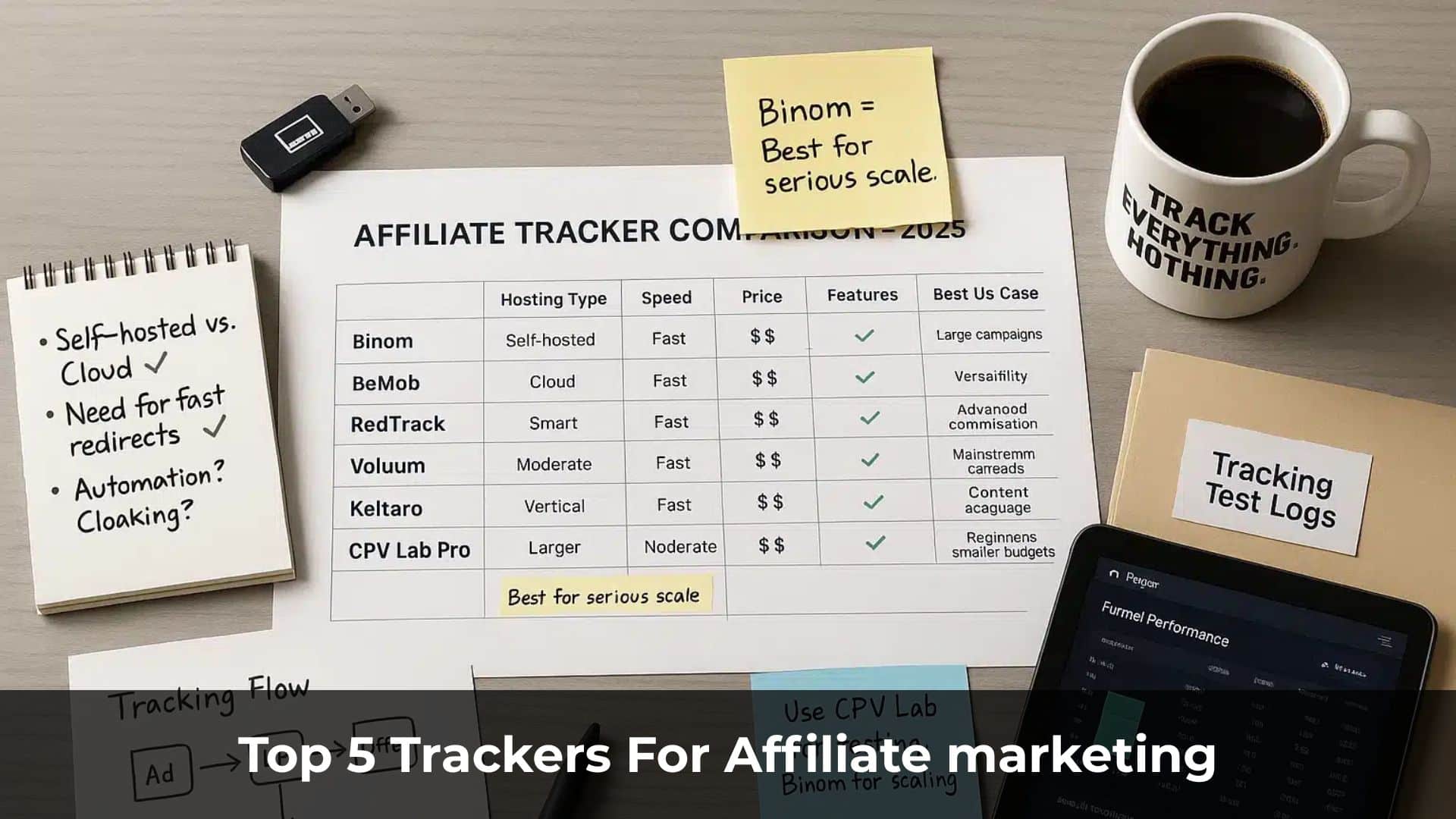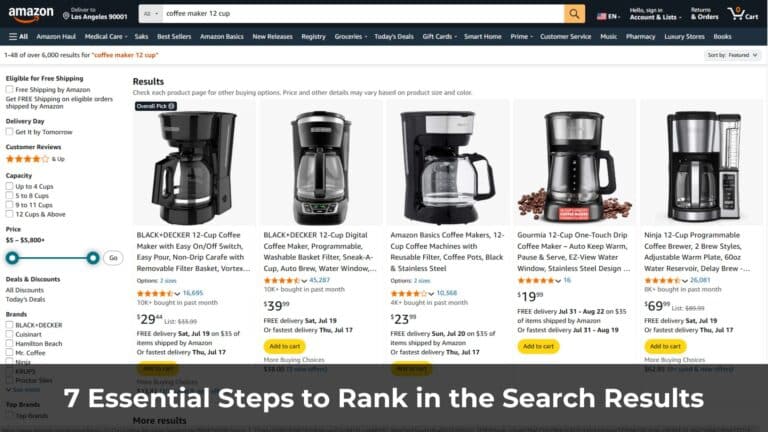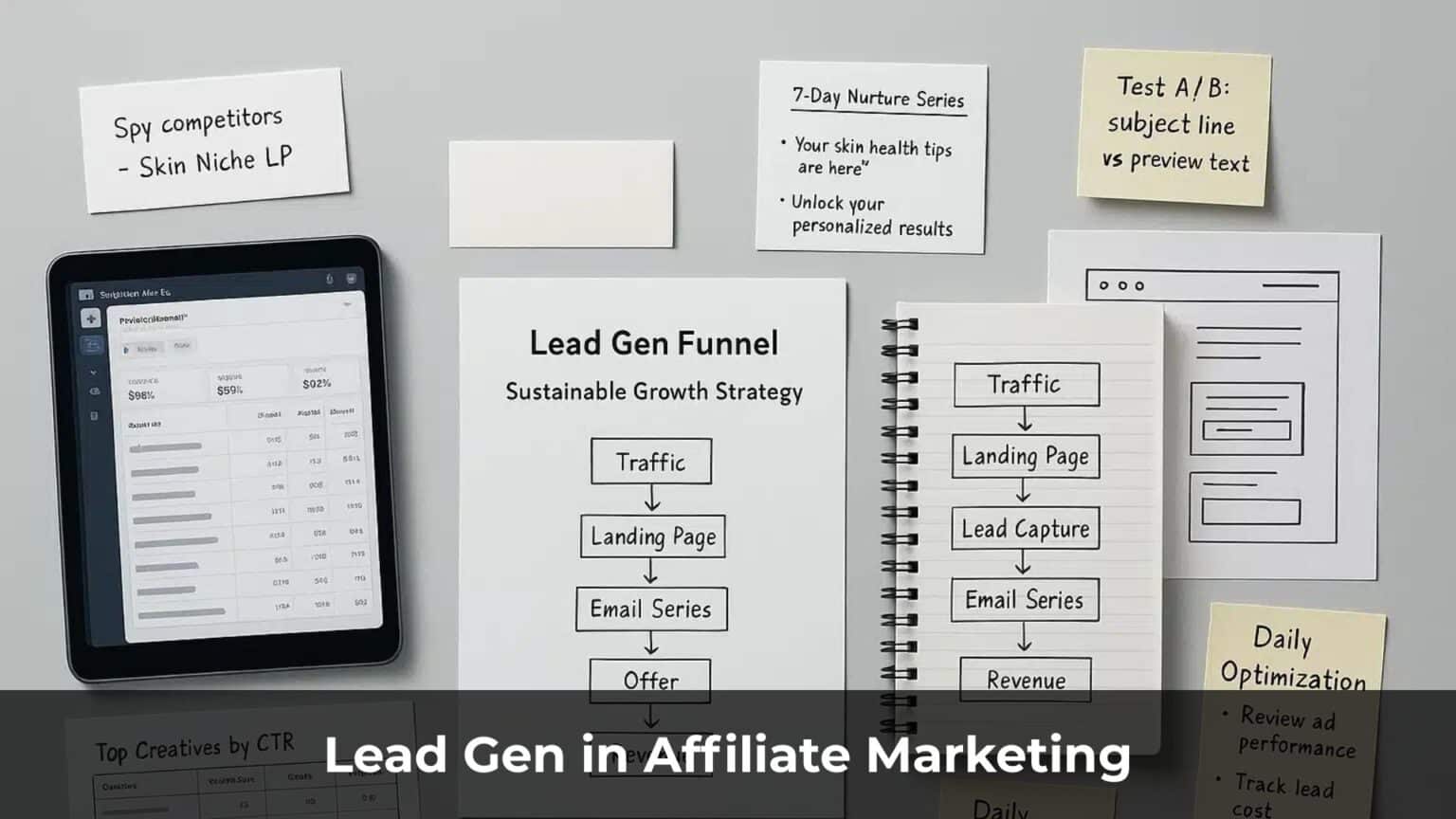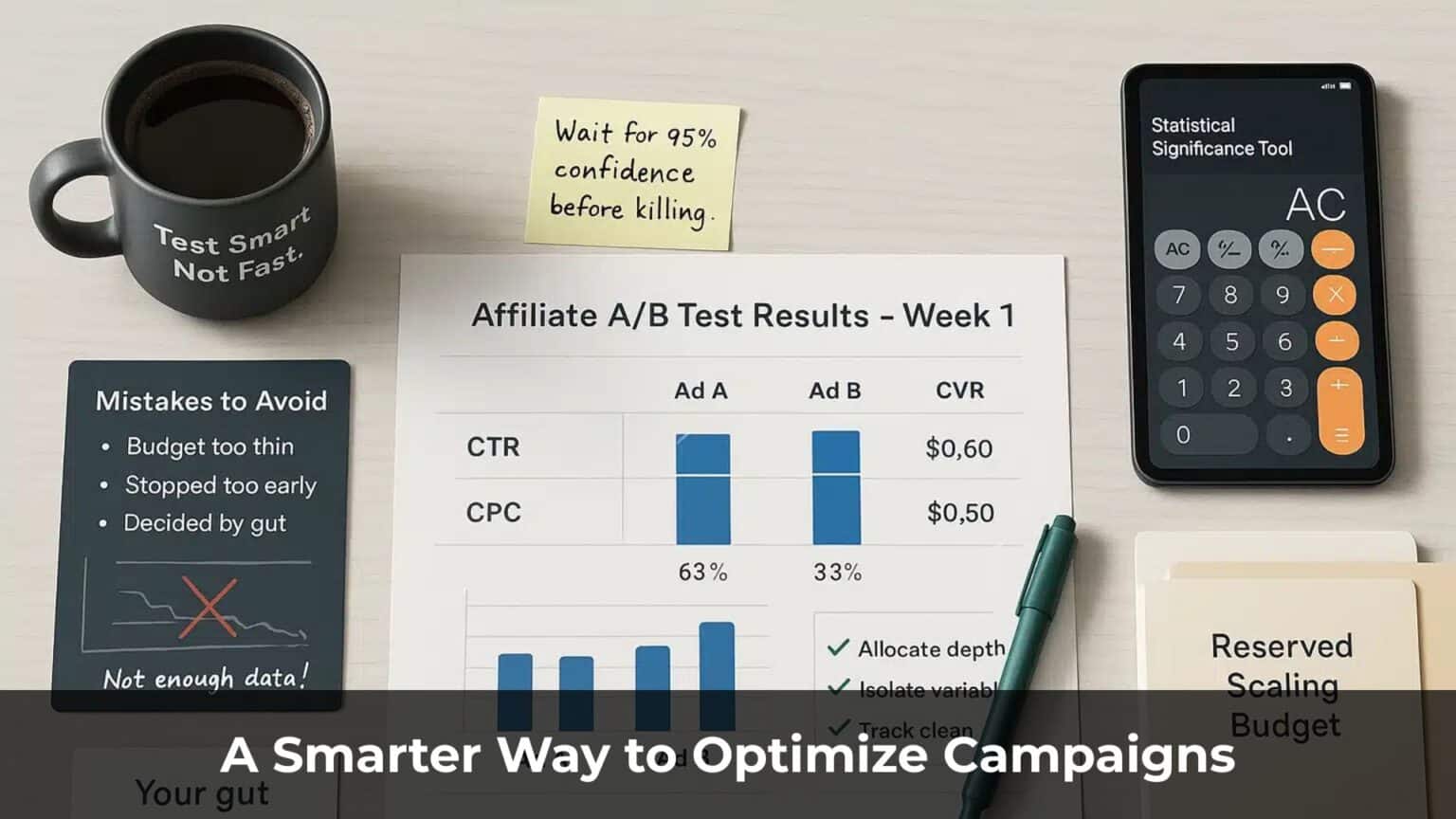Not every affiliate marketer makes a profit.
But among those who do — most know how to use tracking tools the right way.
If you’re promoting affiliate offers with paid traffic, a tracker isn’t optional. It’s essential. It’s how you collect data, optimize campaigns, and turn random spending into strategic testing.
Admittedly, tracking is one of the driest parts of affiliate marketing. It’s technical. It’s not exciting. And if you’re just starting out, it can feel intimidating.
But don’t worry — I’m here to help. Don’t fear the complexity. Learn it, apply it, and you’ll realize… it’s not as hard as it seems.
Once properly set up, a good tracker helps you understand:
– Which ad variations are actually working
– Which landing page converts better
– What’s the CTR on each page
– What your real conversion rates are
Yes, you can run affiliate campaigns without tracking. But your chances of losing money skyrocket.
Because a tracker doesn’t just help you analyze performance — it also sends conversion data back to your traffic source (like Facebook). That feedback loop allows the algorithm to optimize your ads automatically.
In this post, I’ll introduce some of the top tracking tools used by affiliate marketers today.
Table of Contents
ToggleTypes of Affiliate Tracking Tools: Cloud vs. Self-Hosted
When it comes to affiliate tracking tools, there are two main types on the market: cloud-hosted and self-hosted.
Cloud-Hosted – Your data is stored on the provider’s servers. You just sign up, log in, and start tracking. No installation needed.
Popular tools in this category include BeMob, RedTrack, and Voluum.
They’re user-friendly, often come with built-in integrations for Facebook, Google, and other ad platforms — but they usually charge a monthly subscription fee, which can get expensive over time.
And here’s the catch:
If you stop paying, you may lose access to all your campaign data.
There’s also a shared infrastructure risk — since thousands of affiliates use the same system, you might encounter issues like click fraud (bot traffic) or increased chances of ad account bans if your setup isn’t configured correctly.
Self-Hosted – You install the tracking software on your own server (usually a VPS). All data stays under your control. No third-party dependency.
Tools like Binom and Keitaro fall into this category.
Setup takes more effort upfront — but in return, you gain full control, better performance, greater flexibility, and stronger data privacy.
Self-hosted tools are often preferred by experienced affiliate marketers who want to scale seriously without limitations.
Tool-by-Tool Breakdown: Pros and Cons
Over the course of my affiliate journey, I’ve personally used six different tracking tools: BeMob, RedTrack, Voluum, Kintura, Binom, and CPV Lab Pro.
Each has its own pros and cons.
What matters most is choosing the right tool for you — ideally from the very beginning — so you can build a solid foundation and scale your affiliate business long-term without constantly switching platforms.
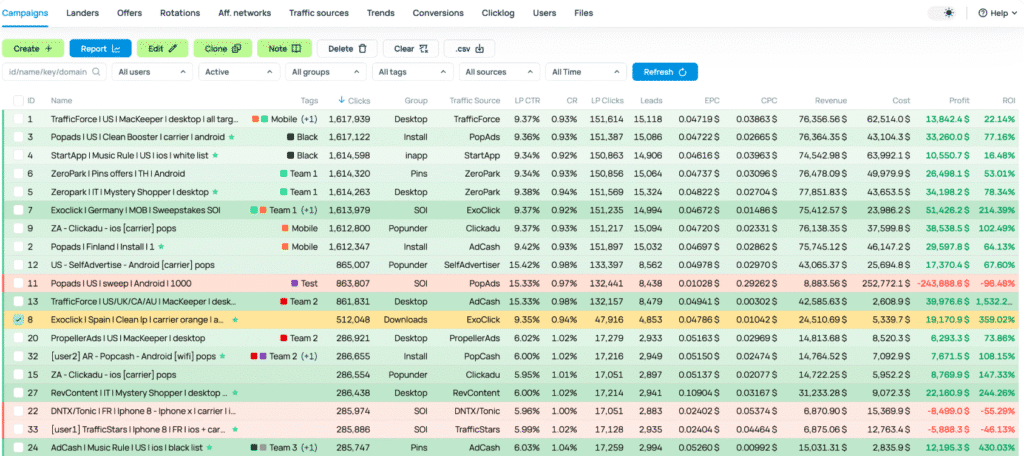
Binom – Long-Term Stability and Full Control
- Type: Self-hosted (installed on your own VPS)
- Price: $119/month – Sign up here
Binom is a go-to tracker — especially for those serious about affiliate marketing and want full control over their system.
It offers fast redirects, a stable infrastructure, and most importantly, you own your data. While Binom doesn’t come with built-in cloaking, you can combine it with Cloudflare + firewall rules to filter bot traffic effectively.
Since it’s self-hosted, you’ll need to rent a VPS and handle the initial setup.
Yes, the setup can feel a bit technical at first — but detailed tutorials are available. And once your server is up and running, you’re good to go.
If your goal is to build a sustainable affiliate business, Binom is one of the best long-term investments you can make.
Why Affiliates Love Binom:
– 30-day free trial
– Handles up to 17 million visits per day
– Unlimited users
– Unlimited custom domains
– Lifetime data storage
– Built-in tools for quick landing page replication
Note: To run Binom, you’ll need a VPS with at least 2 CPU and 4GB RAM, which usually costs around $20/month.
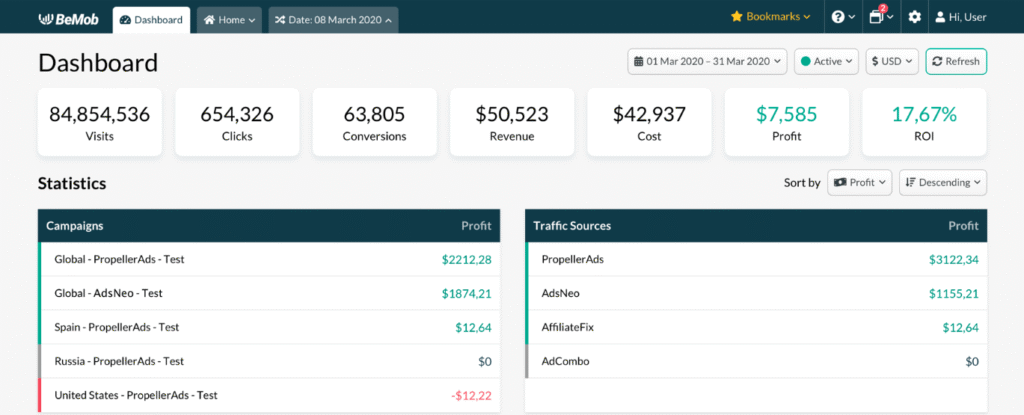
BeMob – Budget-Friendly for Beginners
- Type: Cloud-hosted (data stored on BeMob’s servers)
- Price: $49/month – Sign up here
BeMob is a great entry-level tracker for affiliate marketers who are still learning the ropes — especially when you’re just getting started with tracking setup.
Their free plan gives you up to 100,000 events per month, which is enough to test a few small campaigns using native or push traffic.
The interface is clean and beginner-friendly, with no technical setup required. This is a big advantage if you’re still unfamiliar with concepts like tokens, redirects, or postback URLs.
That said, BeMob does come with a few limitations you should know:
– Using their default domains may increase the risk of Facebook ad account bans
– Misconfigured redirects can also trigger ad disapprovals
– Shared infrastructure = lower protection against bot traffic
If your goal is to learn the basics or run a few small test campaigns, BeMob is a smart and affordable choice.
But if you’re aiming to scale, or planning to run affiliate offers on Facebook or Google Ads, BeMob may not be the tool to grow with you long-term.
I personally used BeMob during my early affiliate days — back when they still offered 1,000,000 free events per month. In fact, BeMob was the tracker I used when I landed my very first profitable campaign.
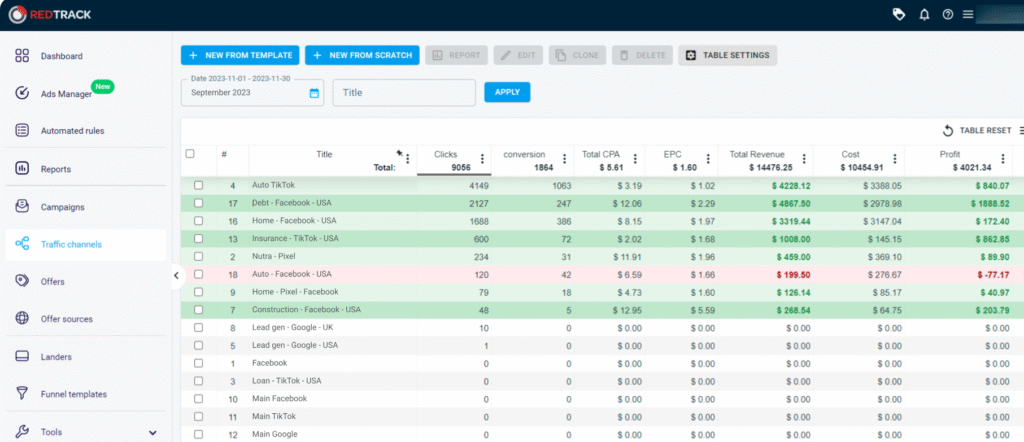
RedTrack – Best for Whitehat Campaigns
- Type: Cloud-hosted (runs on RedTrack’s servers)
- Price: $149/month – Sign up here
RedTrack is a solid choice for affiliate marketers running whitehat campaigns, especially if you have a stable ad budget and prefer a smooth, low-maintenance tracking experience.
One of RedTrack’s biggest strengths is its native integration with Facebook CAPI and Google Ads API, which allows you to send server-side conversion data directly to your ad platforms.
This server-to-platform sync helps Facebook and Google optimize your ads more effectively, leveraging their machine learning algorithms for better performance.
However, RedTrack does not support the ClickBank API, so if you’re promoting ClickBank offers, you’ll need to set up conversions manually.
RedTrack is a great option if you’re running whitehat campaigns on major ad platforms, have the budget to support it, and want to keep your tech stack simple.
No VPS required.
No complex server setup.
And all the tracking features you need to send accurate conversions.
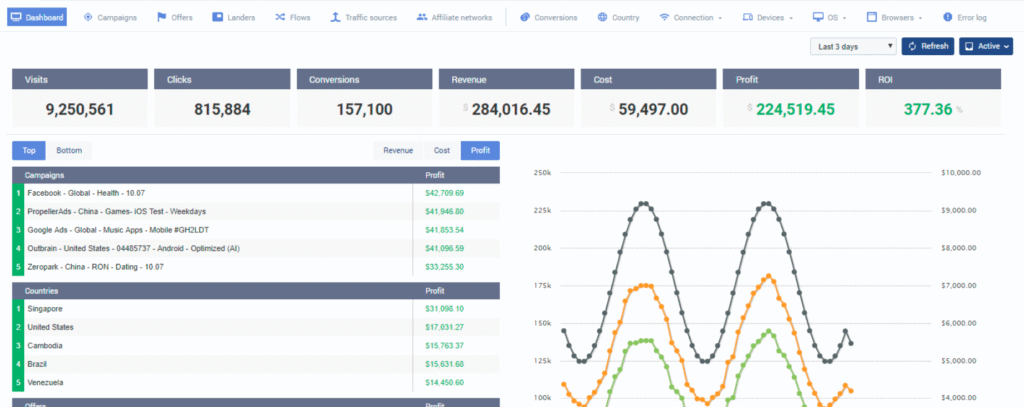
Voluum – Automation-Heavy, Enterprise-Level Tracking
- Type: Cloud-hosted (data stored on Voluum’s servers)
- Price: $149/month – Sign up here
Voluum is a tool that many affiliate marketers rave about — and to be fair, it mostly lives up to the hype. It’s a feature-rich platform with solid infrastructure.
But it also comes with a hefty price tag.
What sets Voluum apart is its automation capabilities. You can set up rules to automatically pause underperforming ads, redirect traffic based on performance, or send real-time alerts when key metrics drop below a set threshold.
If you’re running multiple campaigns and need to react fast — without manually checking dashboards all day — this feature alone can be a game-changer.
Voluum also offers full integration with all major platforms: Facebook CAPI, Google Ads Enhanced Conversions, TikTok, Bing, and more. It supports multi-step postbacks, advanced A/B testing, traffic source ROI tracking, and multi-user team access — making it a great fit for agency-style setups.
But here’s the catch:
Voluum might be one of the best trackers out there, but it’s also one of the most expensive.
At $149/month, you still don’t get access to some of the most advanced features unless you upgrade to higher-tier plans.
Makes you wonder — is it just inflation, or are tracking tools getting a bit too greedy these days?
A few years ago, most trackers cost around $50/month. Now? That’s considered the entry level.
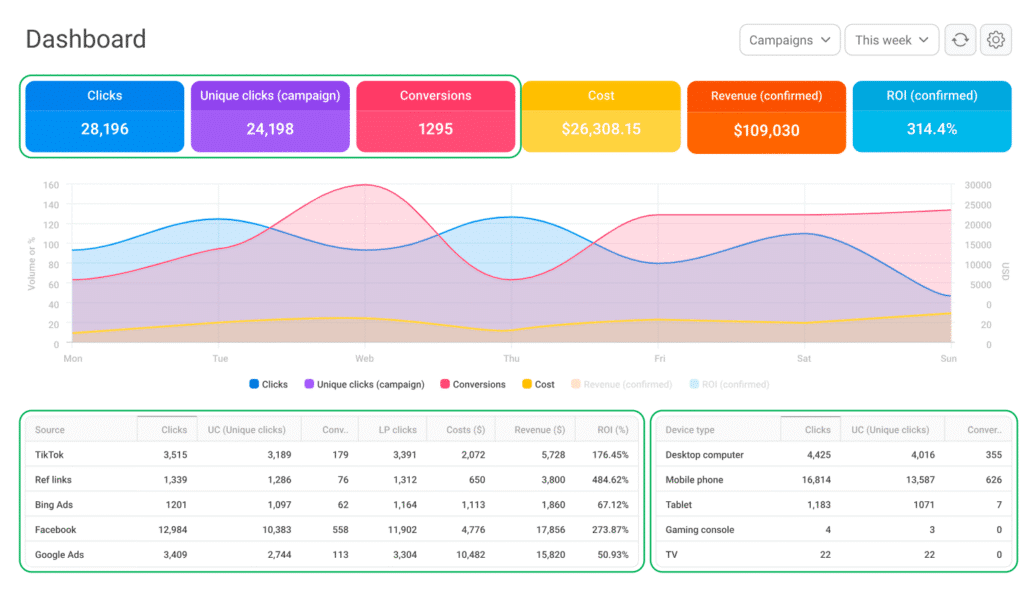
Keitaro – Advanced Cloaking and Custom Rules
- Type: Self-hosted (installed on your own VPS)
- Price: $149/month – Sign up here
Keitaro is a favorite among many blackhat affiliates. It’s often used to bypass ad platform review systems — thanks to its strong cloaking capabilities and flexible rule-based redirects.
That said, Keitaro isn’t just for blackhat. It’s a solid choice for affiliates who need high customization and work with difficult traffic types like push, pop, or campaigns that involve grayhat elements.
Even if you’re running Facebook ads, you can absolutely use Keitaro as your primary tracker for affiliate campaigns. It’s versatile enough to handle whitehat tracking — especially if you know how to configure it right.
One big advantage: pricing flexibility. While the full-featured cloud version costs $149/month, the standard license starts around $59/month, and you can choose your own VPS provider based on traffic volume and performance needs.
This setup gives you more control over your budget, especially if you’re gradually scaling your campaigns.
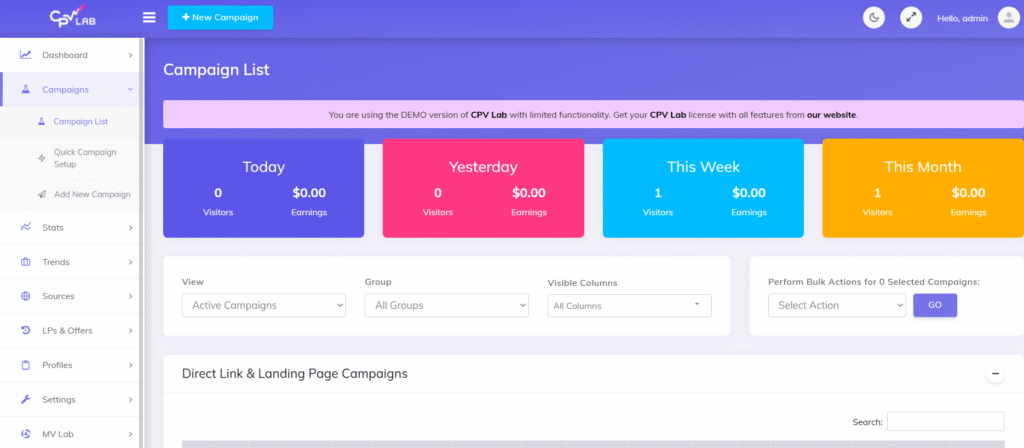
CPV Lab Pro – Affordable with Lifetime License Option
- Type: Self-hosted (installed on your own VPS)
- Price: $149/month – Sign up here
I came across CPV Lab Pro while learning to run Google Ads. It covers all the basic features you’d expect from a tracking tool — and truth be told, some marketers really like it.
Personally, though, I found the interface a bit dated. Maybe I’ve just gotten too used to how clean Binom looks.
One downside with CPV Lab Pro is that their documentation isn’t updated frequently, and the user community is relatively small.
So if you run into technical issues, you might need to troubleshoot on your own or rely on their official support — which tends to be slow.
If you’re running mid-level affiliate campaigns, want to cut costs, and don’t need deep API integrations, CPV Lab Pro is a reasonable option.
And if you catch one of their promotions, you can even grab a lifetime license with a one-time payment.
But if you’re planning to scale aggressively or need a more advanced tracking setup, you’ll likely run into limitations sooner rather than later.
Why I Recommend Binom for Serious Affiliates
If you’re new to affiliate marketing and unsure which tracker to choose, don’t just look for the “easiest tool to use.” Look for the one that’s most reliable in the long run.
For beginners today, I strongly recommend starting with Binom. Here’s why:
Total Ownership and Scalability
Binom is self-hosted — you install it on your own VPS and use your own custom domains.
That means you can send as much traffic as you want, without hitting any event limits like you would with BeMob or Voluum.
Just upgrade your server specs as needed.
Even better, your campaign data is stored for a lifetime.
Most cloud-hosted tools delete your data after a set time unless you keep paying. With Binom, your historical campaigns stay intact — even those from years ago.
You can go back, review what worked, or even use old data to train new team members.
Blazing Fast Redirects and Reporting
What really sets Binom apart is its speed — both in redirect handling and report generation.
If you’re paying for traffic, redirect speed isn’t a luxury — it directly affects your conversion rate.
Unlike many cloud-based trackers that slow down under load, Binom is built on ClickHouse, a high-performance analytics database used by platforms like Yandex and Cloudflare.
The result?
- Near-instant redirects, even with hundreds of thousands of clicks per day
- Lightning-fast reporting, whether filtering by token, landing page, GEO, or time range
- No lags, even when analyzing historical data or running scaled campaigns
Whether you’re buying traffic from Facebook, Google, native, or push networks, fast and responsive tracking means faster insights, better optimizations, and more profit.
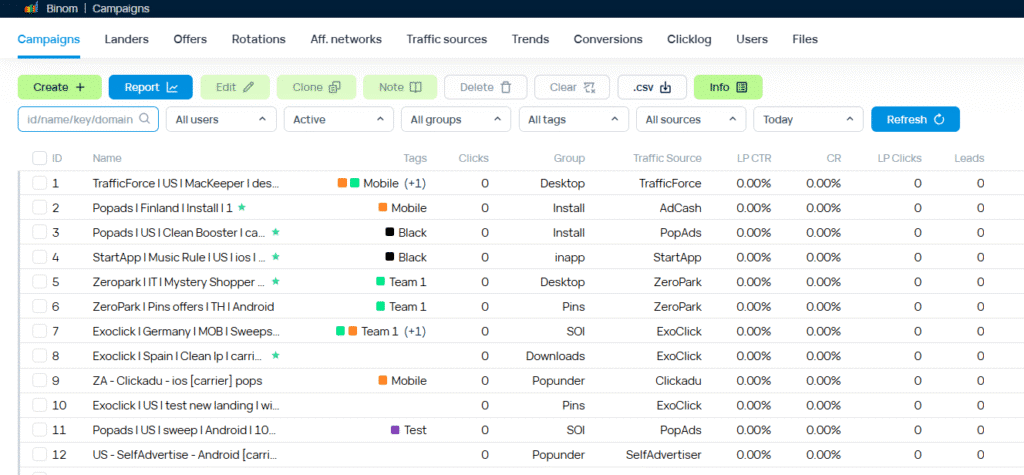
A Dashboard You’ll Actually Enjoy Using
Some people don’t care much about design — as long as the tool works, they’re fine.
But for me, a tracking tool is something I’ll be using every single day, for years to come as I build my affiliate business.
So yes, I want it to look good.
I want a dashboard that feels motivating — something I enjoy opening up every morning. Something that helps me feel focused, not frustrated.
I’ve used BeMob, Voluum, and RedTrack. They all worked, technically. But they always felt like something was… missing.
Maybe it’s just me — I’ve always cared about design. I tend to notice the small things.
And this is where Binom truly shines. The interface is friendly, clean, minimal, and well thought out.
There’s a certain aesthetic precision to it that I appreciate. When I look at the Binom dashboard, I feel like I understand the personality behind the product — and that’s the kind of builder I want to work with.
How to Install Binom?
I’ll walk you through the full setup process inside my Affiliate Masterclass.
If you’re serious about tracking, stay tuned — it’s all covered there.
Final Thoughts and Next Steps
If I were a complete newbie, I’d probably have to wring my brain dry to get through this post.
Tracking? Setup? Technical stuff everywhere?
Yeah — it’s a lot to take in.
Even though I’ve tried my best to explain things as clearly as possible — cutting out unnecessary complexity — this guide still lands on the “advanced” side of the spectrum.
But hey, that’s just how the game works.
The path to success isn’t meant to be easy. The reward goes to those who keep going — even when it’s hard.
If you made it this far, that’s impressive.
Keep pushing forward — for your growth, your success, and your future.
If you found this helpful, I invite you to check out other guides on this site — each written with real-world experience, not hype.
